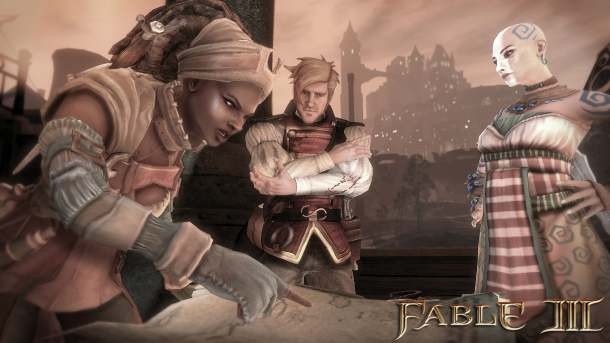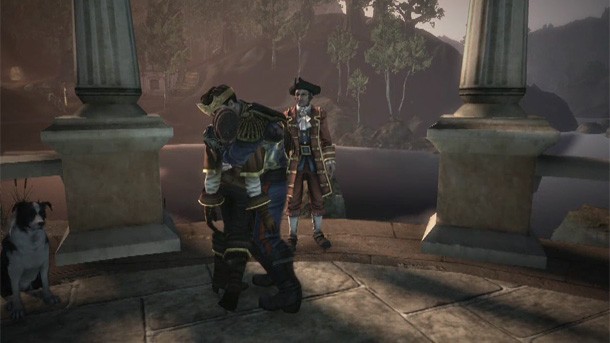Our extra-large special edition is here. Subscribe today and receive the 25% longer issue at no extra cost!
Afterwords: Fable III

When it came time for Lionhead to develop the third installment in the Fable series, the team looked back at previous editions with an eye on streamlining. The results were somewhat controversial. Some players delved into the slimmed-down Albion with no regrets, while others saw changes to magic, combat, and NPC interactions as a clumsy hatchet job. We got in touch with the game’s lead designer, Josh Atkins, to get his take on the changes.
Having a main character who speaks seems to be a big stride forward. What was it about Fable III that made you feel as though it was time to have a talking protagonist?
Giving the main hero a voice was not an easy decision and it was not something that was actually planned at the start of the game. However, one of our central goals for Fable III was to create a strong narrative, and we soon realized we would fail at that goal unless we gave the hero both a voice and a defined place in the world. It would be hard to imagine a mute hero in the first judgment of the game where the player must make a substantial life and death decision.
If you had to narrow Fable III’s optimal audience down to a single hypothetical player, what would he or she be like? A veteran RPG player? Someone new to the genre? Someone new to video games in general?
Every Fable game has been made with the intention that anyone can pick up a controller and be successful, and Fable III was no different. Our goal was to create an accessible and easy to understand game that very casual players could experience and, most importantly, finish. We have heard many great stories about Fable III that led us to believe we were reasonably successful in that goal. My favorite story was the day I randomly discovered my wife's hairdresser who generally watches her boyfriend play games actually played Fable III, enjoyed it, and finished it.
Now that the game is out, is the team satisfied with some of the streamlining decisions made in Fable III? In particular, the interactions were restructured in both how many NPCs could be engaged at once and the overall depth of such encounters. Are you happy with the end result?
We had a real dilemma with both the Fable II interaction method and magic systems. As Peter Molyneux has mentioned in the past, we had statistics that indicated many of our users were not using a substantial amount of the features we created in Fable II. Therefore, after many tricky discussions we came to the conclusion we should simplify a set of our features in an effort to ensure they would be clear and usable by players at every level. Clearly we were a bit surprised by some of the responses we got to these changes, and our goal was never to make our users feel something had been removed unfairly. One thing I like about Lionhead is that we look at each Fable as a standalone product, and while we are influenced by what we have done in the past, we do not let the past be a barrier toward trying to innovate.
Managing property was a tremendous improvement over the last game – particularly with how players can buy and sell real estate from the map menu. At the same time, there’s a fair amount of babysitting when it comes to maintaining the condition of rental properties. Was that deterioration added for the sake of balancing, or were there other reasons?
The decision to have houses require 'upkeep' came from an intention to make property ownership feel like a job and something the player had to care about and think about.

What does the team think about players having (virtual) same-sex relations and raising families together for the sake of achievements?
One nice thing about Fable is that marriage and family life is not limited by sexual orientation, and that is something of which we are proud. I think the idea of exploring different kinds of emotional commitment across Xbox LIVE play is an interesting idea, and it is something we as an industry have not really explored deeply. Clearly the design and content of Fable allows us to do unique things like allowing players to get married and have a family, however, I do not think the experiences have to start and stop with Fable. I do not think that any game has yet to capture the sense of bonding between players that was seen by the characters in Blackhawk Down, Band of Brothers or Saving Private Ryan.
In Fable II, there was a real sense that you were creating your own unique hero. In Fable III, the process isn’t quite as flexible; if you tell a friend that you’re on the third or fourth stage of the Road to Rule, his similarly leveled counterpart will be largely the same. Do you think you hit a satisfactory balance between allowing players to craft their character versus guiding players along?
Overall we think the process of creating your own hero is built around three specific areas of the game. First, there are your powers or how you level your hero on the Road to Rule. Second, there is the way you choose to customize your hero. Third, there are your hero morphs, which are directly tied to the decisions you make. When it comes to the Road to Rule, players not only have a choice of what combat attributes they give their hero, but they also have the option to determine a lot of other aspects of their hero's actual personality by unlocking different kinds of expressions. I think the Road to Rule, combined with these other elements, definitely provides interesting choices to make as you define the type of hero you want to create.
The last part of the game, where you take control of the throne, is excellent. How did the team iterate on that portion of the game? How did you determine how that section would be presented and play?
Firstly I am glad you enjoyed the ruling section of the game. We decided to go with the system as it is now because our main goal was to put the player into a position of responsibility and to ensure that the player felt both the excitement and the burden of power. We were very inspired by the economical and political changes over the last three to four years and we really wanted to give players a glimpse into what we thought 'being in charge' must really feel like. There has not been a leader in modern times who has been able to completely balance out the promises they make against the responsibility of power. That was something we intentionally tried to capture.
Did you skip ahead large portions of time during the king parts to keep players off balance and “punish” them for not planning ahead? Was that section originally planned to be longer?
We had never planned the section to be longer, but the jumps in time were there as both a mechanic to ensure the player felt a sense of pressure and to try and mimic the idea that rulers do not completely define their own schedules. Very rarely do you see presidents, prime ministers, or CEOs managing their own Outlook calendars.

Get the Game Informer Print Edition!
Explore your favorite games in premium print format, delivered to your door.
- 10 issues per year
- Only $4.80 per issue
- Full digital magazine archive access
- Since 1991









